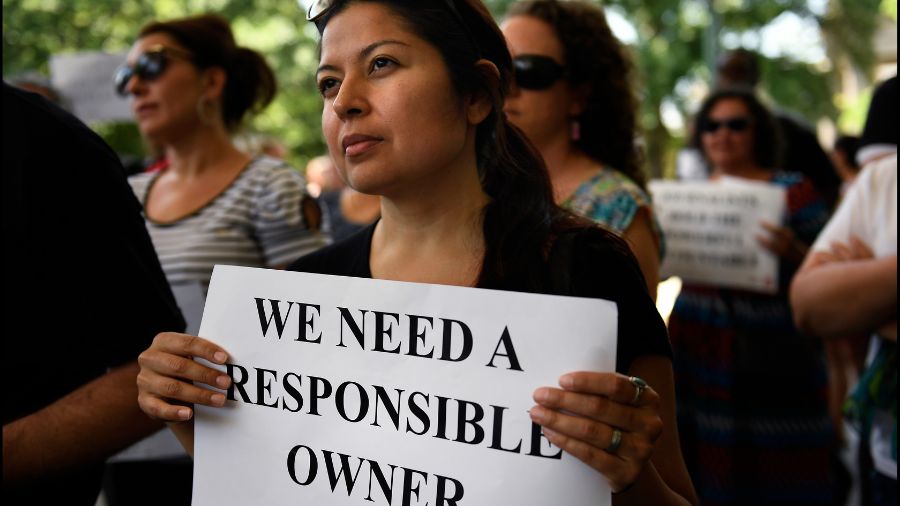Protesters outside Seattle City Hall denounce planned SODO homeless shelter
Sep 20, 2022, 2:47 PM | Updated: 4:29 pm

Protestors outside Seattle City Hall (Nicole Jennings)
(Nicole Jennings)
Approximately 100 people gathered outside Seattle City Hall Tuesday afternoon to protest the planned construction of a homeless shelter in the city’s SODO neighborhood.
In March, King County announced its plan to preserve the existing 270-person Salvation Army shelter in SODO with added capacity for 150 additional people.
The shelter’s construction is one phase of several within the county’s plan to leverage funding made available through President Biden’s American Rescue Plan. Ultimately, King County has set a goal for itself to house 500 homeless individuals throughout Seattle’s downtown and SODO neighborhoods.
‘It’s very bad down here:’ Downtown Seattle hopes ‘clean team’ will improve Third Ave
The current SODO shelter at 1033 Sixth Ave. S operates under a lease that is set to expire in November. The expanded shelter will build 150 beds as part of a micro modular unit expansion, also known as tiny homes, according to the Daily Journal of Commerce (DJC).
In May, the King County Council approved a five-year lease on the property owned by developer Urban Visions. The SODO shelter plans will be revised during a community planning session scheduled for Sept. 28, also according to the DJC.
Many of Tuesday’s protestors spoke in front of the City Council, citing concern that the planned shelter is too close to the city’s International District, made up of Chinatown, Little Saigon, and Japantown.
“I have been living in Chinatown and doing business there for 30 years. I am horrified to learn that the government is going to put together a problematic shelter or campsite very close to Chinatown,” one speaker said.
“CID is a special community unique. 70% to 80% of the residents are seniors and they don’t speak English and then they cannot communicate with the homeless, and they are afraid of them.”
Business owner and Friends of Seattle Chinatown-International District member Tanya Woo said the county’s move mirrors other historical decisions made by local government about predominantly Asian neighborhoods.
“This was approved back in May, and we’re just hearing about it this month … We are most disappointed in the lack of transparency, lack of outreach, and engagement with the community,” Woo said. “It follows the history of forced policies onto our community, which we had no input in.”
She added, “The fact that they never consulted the community, they never reached out to us, there was no engagement or outreach is systemic racism. I feel like they’re taking advantage of our Asian politeness.”
This comes after a rough two-and-a-half years for the Chinatown-International District, including a nationwide trend of hate crimes against Asian-Americans and the pandemic’s impact on small businesses.
“Our community is struggling. The anti-Asian hate, pandemic racism … we just really need to heal and get over all that past trauma,” Woo said. “And having this project sprung on us without any warning — it feels like a betrayal.”
Woo emphasized that the community members have nothing against people who are unhoused, but rather are worried about the criminals who might be attracted to the area if they know about the shelter.
“The unhoused are not the problem,” Woo said. “It’s the people who prey on them — the drug dealers.”
Woo said there has already been a major increase in violent crime in the area — and it has completely changed the feel of the neighborhood.
“Seniors are fearful at night. I remember pre-pandemic you could go out to Hing Hay Park at midnight and there would be seniors sitting there listening to Chinese opera. Now, you would never see that,” Woo said.
Longtime Chinatown resident Jay Yanamura agreed.
“We hear gunshots all the time,” he said. “We do have break-ins — we’ve had many burglaries in our building. The condominium that I live in has a lot of older, Asian octogenarians and they’re afraid to go out.”
Yanamura said he and his wife have noticed a definitive uptick in crime on their daily walks — especially crimes committed against small businesses.
“One of the stores we go to, the lady who runs it is 70 or 80 years old, and she runs down the street after the shoplifters who come in every day and steal from her … that’s the kind of crime we see every day,” he said.














